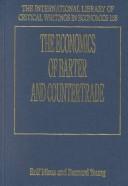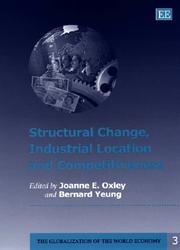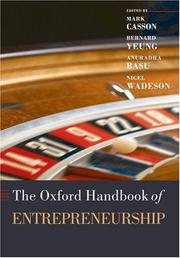| Listing 1 - 10 of 56 | << page >> |
Sort by
|

Abstract | Keywords | Export | Availability | Bookmark
 Loading...
Loading...Choose an application
- Reference Manager
- EndNote
- RefWorks (Direct export to RefWorks)
Digital
Year: 2009 Publisher: Cambridge, Mass National Bureau of Economic Research
Abstract | Keywords | Export | Availability | Bookmark
 Loading...
Loading...Choose an application
- Reference Manager
- EndNote
- RefWorks (Direct export to RefWorks)
Different economies at different times use different institutional arrangements to constrain the people entrusted with allocating the economy's capital and other resources. Comparative financial histories show these corporate governance regimes to be largely stable through time, but capable of occasional dramatic change in response to a severe crisis. Legal origin, language, culture, religion, accidents of history (path dependence), and other factors affect these changes because they affect how people and societies solve problems.
Digital
Year: 2010 Publisher: Cambridge, Mass. National Bureau of Economic Research
Abstract | Keywords | Export | Availability | Bookmark
 Loading...
Loading...Choose an application
- Reference Manager
- EndNote
- RefWorks (Direct export to RefWorks)
Economics has firms maximizing value and people maximizing utility, but firms are run by people. Agency theory concerns the mitigation of this internal contradiction in capitalism. Firms need charters, regulations and laws to restrain those entrusted with their governance, just as economies need constitutions and independent judiciaries to restrain those entrusted with government. Agency problems distort capital allocation if corporate insiders are inefficiently selected or incentivized, and this hampers economic growth absent a legal system with appropriate constraints. However, political economy problems and agency problems in corporations may reinforce each other, compromising the quality of both corporate governance and government.
Digital
Year: 2011 Publisher: Cambridge, Mass. National Bureau of Economic Research
Abstract | Keywords | Export | Availability | Bookmark
 Loading...
Loading...Choose an application
- Reference Manager
- EndNote
- RefWorks (Direct export to RefWorks)
Economics and history both strive to understand causation: economics using instrumental variables econometrics and history by weighing the plausibility of alternative narratives. Instrumental variables can lose value with repeated use because of an econometric tragedy of the commons bias: each successful use of an instrument potentially creates an additional latent variable bias problem for all other uses of that instrument – past and future. Economists should therefore consider historians' approach to inferring causality from detailed context, the plausibility of alternative narratives, external consistency, and recognition that free will makes human decisions intrinsically exogenous.
Digital
Year: 2017 Publisher: Cambridge, Mass. National Bureau of Economic Research
Abstract | Keywords | Export | Availability | Bookmark
 Loading...
Loading...Choose an application
- Reference Manager
- EndNote
- RefWorks (Direct export to RefWorks)
Japan, an isolated, backward country in the 1860s, industrialized rapidly to become a major industrial power by the 1930s. South Korea, among the world's poorest countries in the 1960s, joined the ranks of First World economies in little over a single generation. China now seems poised to follow a similar trajectory. All three cases highlight the importance of marginalized traditional elites, intensive early investment in education, a degree of economic openness, free markets, equity financing, early-stage coordination of firms in diverse industries via arrangements such as business groups, and political institutions capable of curbing the power of families grown wealthy in early-stage rapid development to make way for prosperity sustained by efficient resource allocation to high-productivity firms.
Digital
Abstract | Keywords | Export | Availability | Bookmark
 Loading...
Loading...Choose an application
- Reference Manager
- EndNote
- RefWorks (Direct export to RefWorks)

ISBN: 1858986885 Year: 1998 Volume: 3 Publisher: Cheltenham Elgar
Abstract | Keywords | Export | Availability | Bookmark
 Loading...
Loading...Choose an application
- Reference Manager
- EndNote
- RefWorks (Direct export to RefWorks)
Industrial economics --- Trade theory --- Firms and enterprises --- International economic relations --- Organization theory --- International business enterprises. --- Industrial location. --- Organizational change. --- Entreprises multinationales --- Industrie --- Changement organisationnel --- Localisation --- 658.11 --- Industrial location --- International business enterprises --- Organizational change --- AA / International- internationaal --- 331.32 --- 338.32 --- 380.23 --- Change, Organizational --- Organization development --- Organizational development --- Organizational innovation --- Management --- Organization --- Manpower planning --- Business enterprises, International --- Corporations, International --- Global corporations --- International corporations --- MNEs (International business enterprises) --- Multinational corporations --- Multinational enterprises --- Transnational corporations --- Business enterprises --- Corporations --- Joint ventures --- Business location --- Industries --- Industries, Location of --- Location of industries --- Plant location --- Regional planning --- Space in economics --- Kinds and forms of enterprise --- Structuur van de economie. --- Vestigingsplaats en specialisatie van de productie. Ondernemingscentra. --- Vorming van internationale prijzen. Internationale gelijkheden en verschillen. Concurrentievermogen. --- Location --- 658.11 Kinds and forms of enterprise --- Structuur van de economie --- Vestigingsplaats en specialisatie van de productie. Ondernemingscentra --- Vorming van internationale prijzen. Internationale gelijkheden en verschillen. Concurrentievermogen
Digital
ISBN: 9789814311045 9789814311052 Year: 2010 Publisher: Singapore ISEAS Publishing
Abstract | Keywords | Export | Availability | Bookmark
 Loading...
Loading...Choose an application
- Reference Manager
- EndNote
- RefWorks (Direct export to RefWorks)

ISBN: 0199288984 9780199288984 Year: 2006 Publisher: Oxford Oxford University Press
Abstract | Keywords | Export | Availability | Bookmark
 Loading...
Loading...Choose an application
- Reference Manager
- EndNote
- RefWorks (Direct export to RefWorks)
Entrepreneurship --- bedrijven, management --- economische groei --- et al --- innovatie --- KMO's --- ondernemerschap --- werkgelegenheid --- 658.116 --- 658 --- Entrepreneur --- Intrapreneur --- Capitalism --- Business incubators --- 658 Zaakvoering, administrat --- Zaakvoering, administrat --- 658 Business management, administration. Commercial organization --- Business management, administration. Commercial organization --- Technologische ontwikkeling. Innovatie. Ondernemerschap --- Organization theory
Digital
Year: 2009 Publisher: Cambridge, Mass National Bureau of Economic Research
Abstract | Keywords | Export | Availability | Bookmark
 Loading...
Loading...Choose an application
- Reference Manager
- EndNote
- RefWorks (Direct export to RefWorks)
We observe less efficient capital allocation in countries whose banking systems are more thoroughly controlled by tycoons or families. The magnitude of this effect is similar to that of state control over banking. Unlike state control, tycoon or family control also correlates with slower economic and productivity growth, greater financial instability, and worse income inequality. These findings are consistent with theories that elite-capture of a country's financial system can embed “crony capitalism”.
| Listing 1 - 10 of 56 | << page >> |
Sort by
|

 Search
Search Feedback
Feedback About UniCat
About UniCat  Help
Help News
News